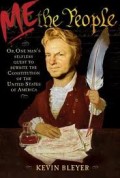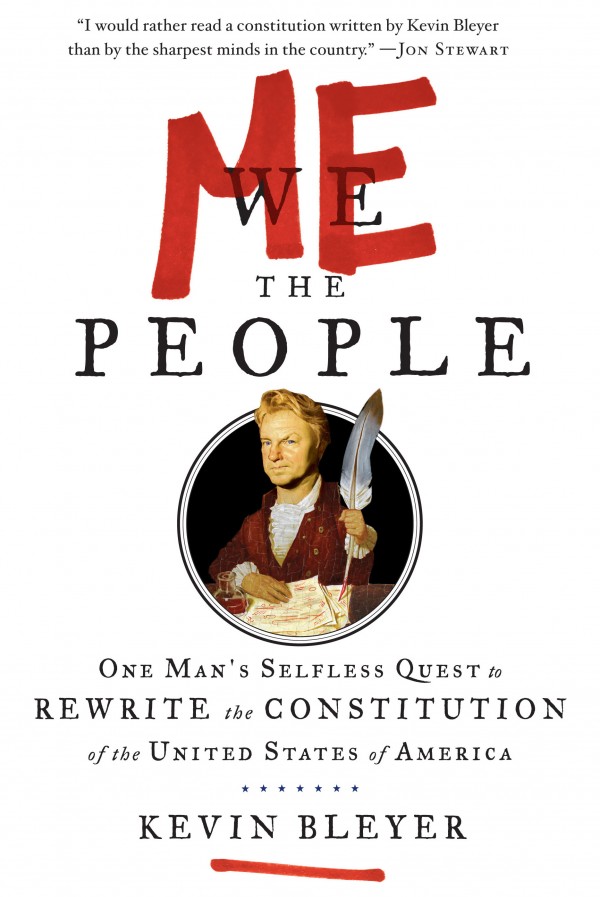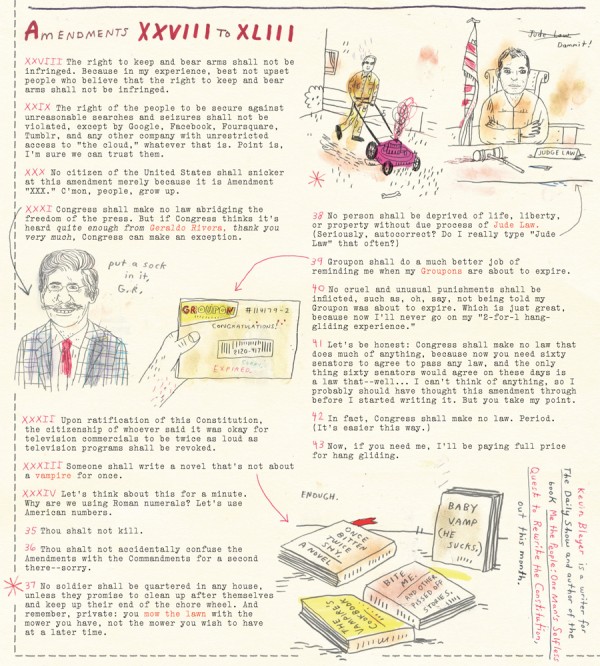![]() BY JONATHAN VALANIA The Constitution may be a remarkable schematic of human rights in a liberal democracy but it’s a terrible piece of comedy. Seriously, I didn’t laugh once. And what the world needs now, besides love-sweet-love, is funny. Kevin Bleyer has a pretty impressive resume in The Funny: humorous commentaries on NPR’s All Things considered; staff writer for Bill Maher and Dennis Miller; joke writer for President Obama’s White House Correspondence Dinner speeches; three Emmys and more than a 1000 broadcast hours of The Daily Show With Jon Stewart under his belt as a staff writer. One day he looked in the mirror and he asked himself, “Who better to make good on Thomas Jefferson’s dictum that the Constitution should be re-written every 19 years to reflect the changing face of the nation than me?” And the answer was simple. Nobody. The result is Me The People: One Man’s Selfish Quest To Re-Write The Constitution of the United States Of America, which he will be discussing at the National Constitution Center tomorrow night. It’s a hoot. You’ll laugh, you’ll cry, you might even learn something. Not that anything’s riding on this except the, uh, first amendment to the Constitution, freedom of the press, and maybe the future of the country. Not that any of that matters, but if you guys fuck up again, I’m going to get mad. Goodnight. Wait, that’s the pep talk Ben Bradlee gives Woodward and Bernstein at the end of All The President’s Men. Well, you get the picture.
BY JONATHAN VALANIA The Constitution may be a remarkable schematic of human rights in a liberal democracy but it’s a terrible piece of comedy. Seriously, I didn’t laugh once. And what the world needs now, besides love-sweet-love, is funny. Kevin Bleyer has a pretty impressive resume in The Funny: humorous commentaries on NPR’s All Things considered; staff writer for Bill Maher and Dennis Miller; joke writer for President Obama’s White House Correspondence Dinner speeches; three Emmys and more than a 1000 broadcast hours of The Daily Show With Jon Stewart under his belt as a staff writer. One day he looked in the mirror and he asked himself, “Who better to make good on Thomas Jefferson’s dictum that the Constitution should be re-written every 19 years to reflect the changing face of the nation than me?” And the answer was simple. Nobody. The result is Me The People: One Man’s Selfish Quest To Re-Write The Constitution of the United States Of America, which he will be discussing at the National Constitution Center tomorrow night. It’s a hoot. You’ll laugh, you’ll cry, you might even learn something. Not that anything’s riding on this except the, uh, first amendment to the Constitution, freedom of the press, and maybe the future of the country. Not that any of that matters, but if you guys fuck up again, I’m going to get mad. Goodnight. Wait, that’s the pep talk Ben Bradlee gives Woodward and Bernstein at the end of All The President’s Men. Well, you get the picture.
PHAWKER: What was wrong with the Constitution that it needed fixing?
KEVIN BLEYER: There are a thousand answers to that beginning with this: I had no choice but to rewrite the Constitution. No less than Thomas Jefferson told me that I had to. He told me that every Constitution naturally expires after 19 years. So by his math, not mine but by his math (and I think we can all agree that he is one of the founderest of the founding fathers) he said that the Constitution should be rewritten every 19 years so by his math it should have been rewritten 11 times by now. It’s been expired for about 200 years so quite frankly I owe everybody in Philadelphia and the country an apology that I haven’t gotten to it before now. But I’ve finally got to it.
PHAWKER: On behalf of the nation, I thank you. Are there any other rewrites of the Constitution that you admire?
KEVIN BLEYER: The most significant rewrite of the Constitution which was done by a gentleman named Rexford Guy Tugwell who spent the last three years of his life doing the…I guess the best way to put it is ‘the serious version  of my comedy book.’ He wrote the entire Constitution, top to bottom every article, every Amendment but his intention was in fact to get the darn thing ratified. He’s a fascinating character who’s actually a member of FDR’s Brain Trust.
of my comedy book.’ He wrote the entire Constitution, top to bottom every article, every Amendment but his intention was in fact to get the darn thing ratified. He’s a fascinating character who’s actually a member of FDR’s Brain Trust.
PHAWKER: I see. Getting back to the matter at hand, your version of the Constitution, your rewrite. What’s the take away here? What’s the big change? What can we expect will be different in America when and if this gets ratified? Not if, when rather.
KEVIN BLEYER: I appreciate you optimism. Truly. And I will count on you to be my bell ringer.
PHAWKER: I’ll be your herald.
KEVIN BLEYER: As you can imagine I did a page one rewrite. Which means that every article and every amendment from top to bottom I fixed. But what’s great about my Constitution rather than the let’s say tinkering at the margins of the Amendments we’ve done for the last say century or so, I make great changes to the Constitution beginning with the Preamble of course. I’ve made the darn thing rhyme because after all it was written by Governor Morris who frankly majored in poetry when he was in college so I thought ‘If you wrote it, why didn’t the darn thing rhyme?’ so I fixed that.
PHAWKER: Let me ask you a question that has been kicking around in the wake of the new Aaron Sorkin show. What makes America the greatest nation on Earth?
KEVIN BLEYER: That’s a fair question. It’s not the greatest nation on Earth. That’s my answer, professor. No, I’m just quoting [from the show] there.
PHAWKER: Ballsy.
PHAWKER: You are still a Daily Show writer, correct?
KEVIN BLEYER: Yeah, I’ve been there for seven years now.
PHAWKER: Can you walk us through a day in the making of a Daily Show episode?
KEVIN BLEYER: Well, it’s a pretty well-oiled machine which is a good thing when it comes to television because a lot of television shows are designed to suck the life out of you but this is not the case with the Daily Show. I show up there and you know 8:30, 8:45. We screen a lot of footage in the first hour. We decide what is the footage that make us the angriest, which is the footage that make us the funniest, that is to say what have we been screaming at the most, what footage are we making fun of and then also what is the biggest story? So we make a Venn diagram of those three things. Biggest story, best footage, and also what can we do with it? That’s becomes more or less our first headline and also our first segment. Then there’s always our second segment which is always more kind of pensive. Between the two of those what we do is we write those up and by 1 pm at the latest have our first draft of what would be the show for that night. We then rewrite the damn thing by 3:30, 4 o’clock, rehearsal’s at 4:30 then we air at 6. So it’s not wizardry.
PHAWKER: And there is a crew of people that have to wade through all these daily news feeds? Is that how it works?
KEVIN BLEYER: There are some researchers. That’s true. But it is really much more of a collaborative environment than you might expect. That is to say all the writers have to show up with good ideas about what they’ve seen  overnight and the researchers do, too. There are researchers who basically set up and stream us a bunch of stuff at 9 am but more or less we’ve heard or seen most of that stuff already. So I think what you’re probably asking is how we do all that deep dive stuff where like Newt Gingrich said this, but did he not five years ago or eight years ago did he not say the exact opposite? We have a guy that has a deep memory for that stuff. We have a head researcher. A guy named Adam who is kind of a genius with that stuff. He’s got a photographic, or rather a videographic memory for a lot of things that have gone on in the last 15 years and we rely on him a lot. We also use some video cataloging software that helps us out when we know what we’re looking for.
overnight and the researchers do, too. There are researchers who basically set up and stream us a bunch of stuff at 9 am but more or less we’ve heard or seen most of that stuff already. So I think what you’re probably asking is how we do all that deep dive stuff where like Newt Gingrich said this, but did he not five years ago or eight years ago did he not say the exact opposite? We have a guy that has a deep memory for that stuff. We have a head researcher. A guy named Adam who is kind of a genius with that stuff. He’s got a photographic, or rather a videographic memory for a lot of things that have gone on in the last 15 years and we rely on him a lot. We also use some video cataloging software that helps us out when we know what we’re looking for.
PHAWKER: In the seven years you’ve been doing this obviously the velocity of the news cycle has increased dramatically. Has that change the way you guys play your game?
KEVIN BLEYER: Not really. I feel like our obligation is to do our best version of a 22 minute piece of analysis. It is true that the cycle has kind of sped up but people rely on us to deliver an insightful interpretation of what actually happened so because of that we don’t feel compelled to do an instant response the way that the 24 hour networks need to do. We actually can say ‘Hey this just broke, we’ll get to it tomorrow. Meantime we got this for you.’
PHAWKER: Since 2008 you’ve been contributing jokes to the President’s White House Correspondents Dinner speech, correct?
KEVIN BLEYER: Right.
PHAWKER: I’m curious how that works. Do you guys like all sit around with the president with beers and roll big doobies and get really wasted and then the president starts saying some funny shit and you write it down like ‘This is  going be awesome!’ Is that how it works?
going be awesome!’ Is that how it works?
KEVIN BLEYER: None of what you’ve said is true, unfortunately. We write a first draft, we write a second draft, it goes to the President and then he weighs in and says whether or not he thinks it’s funny and then we’ll re-write it up to the last day.
PHAWKER: As you may well be aware that a significant portion of respondents to surveys of people under 40 say that the Daily Show is their primary source of news. Presumably you guys take that pretty seriously. You know, with great power comes great responsibility etc.
KEVIN BLEYER: Fair enough. I will say that is entirely encouraging and utterly horrifying. I would presume there is a vast buffet of news and we are but the dessert but yes. We try to get it right. We try to get the first half, that is to say the news right. The punch line is on us and it’s on the American people to realize we’re being funny.


